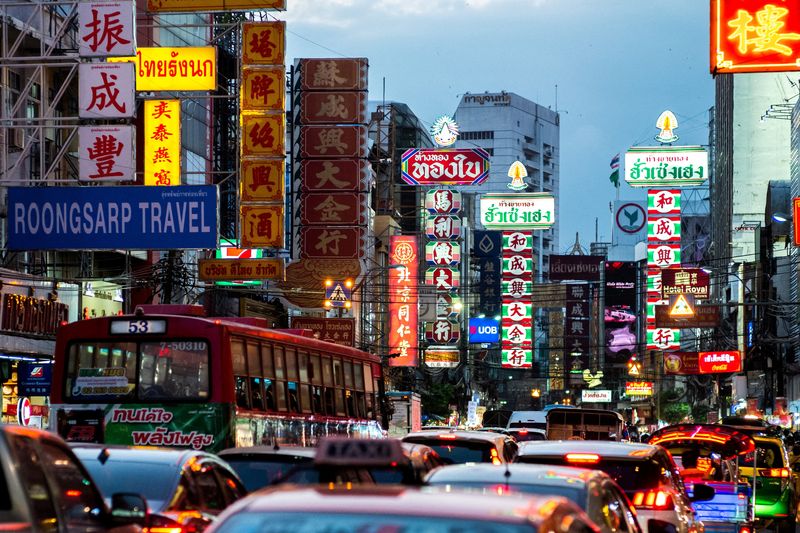
© Reuters. FILE PHOTO: Site visitors jam at Bangkok’s China city, one of many prime vacationer attraction spots as Thailand is anticipating arrivals of Chinese language vacationers after China reopens its borders amid the coronavirus (COVID-19) pandemic, in Bangkok, Thailand, January 6, 2023.
2/4
By Tom Westbrook and Stella Qiu
SINGAPORE/SYDNEY (Reuters) – The top of China’s strict COVID-19 border controls is prompting pent-up money to start flowing overseas, actual property brokers and property knowledge from Australia to Singapore recommend.
Chinese language demand helps enhance Singapore property costs, Chinese language college students are snapping up flats in Sydney and Melbourne, and brokers say Chinese language curiosity is ticking up in Thailand.
Information on the early trickle of outflows is scarce, however the indicators recommend new demand to get capital out of China, the place actual property confidence is fragile and the federal government’s tax guidelines and criticism of wealth accumulation make investing overseas extra enticing.
“Enquiries from regional Asia property traders have doubled because the borders opened, particularly from the Chinese language,” stated Ian Chen, founder and chief govt of Jalin Realty, which operates in China, Australia, Malaysia and Singapore.
“A lot of the traders who’re shopping for now are those that simply have to get some cash out. We’re not seeing a giant wave, however undoubtedly there’s curiosity and lots of enquiries – particularly from college students who’re coming again to Australia.”
Wealthy and middle-class Chinese language have lengthy sought to maneuver some wealth overseas to diversify their investments and preserve some belongings past the attain of authorities, simply in case.
Early indicators level to a lot smaller flows than in earlier episodes, equivalent to one in 2016 that triggered tighter controls on shifting cash from China. However they point out that within the wake of the pandemic, Chinese language households want to relocate belongings, and even themselves, abroad.
The restrictions on shifting cash overseas will probably stop a flood of outflows or a big effect on the world’s second-biggest financial system, however the development signifies some insecurity and weighs on the forex, which has struggled to advance as China relaxed its COVID guidelines.
MONEY TRAVELS
Australia’s property knowledge isn’t damaged down by nationality, however brokers say latest international curiosity has helped stabilise costs and push clearance charges in Sydney to a one-year excessive in February.
Singapore is seeing households and cash flowing in.
Joey Wang, a director at CS Corp, an accounting agency that gives migration recommendation within the city-state, has gained some 300 principally Chinese language shoppers because the pandemic. “COVID and the lockdown gave folks lots of time to consider their future,” Wang stated.
Dwelling purchases in Singapore, the place Chinese language are the highest international consumers, cooled early in 2023 from final 12 months’s torrid tempo – however solely barely regardless of a steep rise in actual property stamp duties.
The Singapore American College has “seen important curiosity from Chinese language households trying to enrol,” it stated in an announcement responding to Reuters questions.
Canada, one other actual property market common with Chinese language traders, has put a two-year ban on international purchasers. Brokers in Thailand say gross sales enquiries from China are beginning to choose up.
International-currency deposits at China’s industrial banks fell 16.2% within the 12 months by way of February, although it’s unclear whether or not that implies flows overseas.
One “measurement of disguised capital flight” is persistent web capital outflows by way of tourism however for different functions, analysts at French financial institution Natixis stated in a observe, referring to bigger capital transfers that accompany journey.
“Lots of people have been travelling to Thailand since reopening and they’ll take a look at the property market,” stated Jenny Yan, advertising and marketing supervisor at a Shenzhen firm that specialises in shopping for abroad properties.
“Properties in Thailand or Malaysia are fairly low cost, even cheaper than these in a third-tier Chinese language metropolis,” she stated, with a luxurious home costing about 2 million yuan ($300,000) and an house 1 / 4 of that.
“With this many individuals travelling, there shall be demand for purchasing.”
($1 = 6.8508 renminbi)